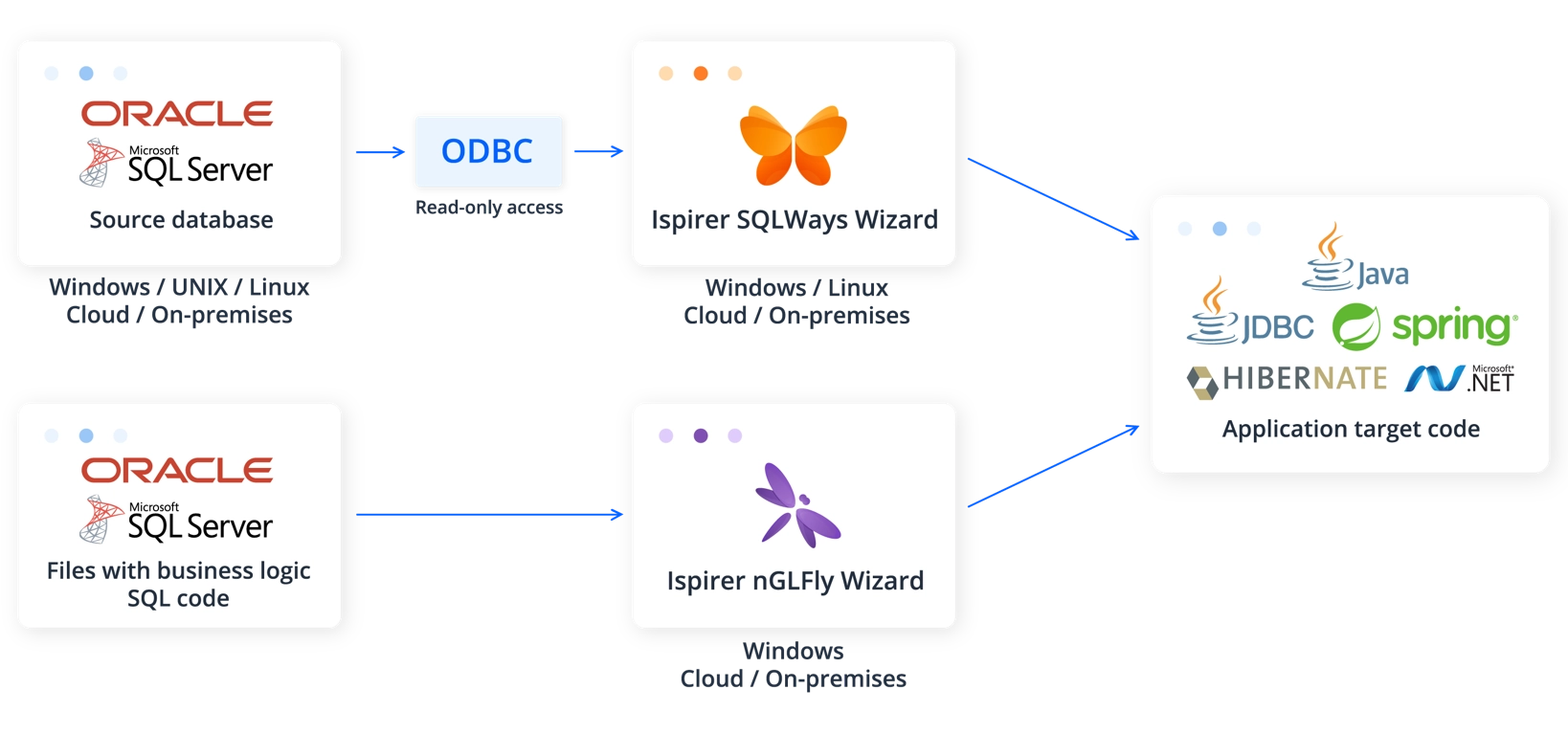Migrate PostgreSQL to MongoDB
Successful migration from relational to NoSQL databases is a function of a proper migration strategy and a team of true professionals. Ispirer’s comprehensive migration services and 20+ years of experience in database modernization help us ensure that your future database will be fast, secure, and cost-efficient.
Migration Services with Ispirer
Get Started with Ispirer Migration Services
From requirements elicitation to monitoring of the database performance. The Ispirer team will ensure success on your journey to MongoDB!
Key Differences between RDBMS & MongoDB
| Feature | RDBMS | MongoDB |
| Data model | Structured with tables, columns, and rows | Flexible document-based data model allows for easy integration of unstructured data |
| Scalability | Limited to vertical scaling | Horizontal scaling across multiple servers allows for high scalability |
| Structure | Table-based with predefined rigid schema | Document-based with more flexibility |
| Speed | Data is stored in different tables, so running queries requires integrating data and setting restrictions, which slows down query time | One record stores all the query data which speeds up finding matched records |
Trust Our Experts for Effortless Migration Experience

The process of transition to MongoDB includes the following steps:
- Database assessment and requirements elicitation
- MongoDB schema design. Correlation of the relational data model with MongoDB collections, documents, and fields.
- Data migration planning and data modification. Convert the SQL data into a format that can be imported into MongoDB.
- Code migration and application modification. This step includes the migration of SQL code from the source database. App modification includes converting the connection to the database, accessing it, converting the Embedded SQL in the application, as well as the rest of the queries.
- Data migration testing. Export of the data from the existing relational database to MongoDB and its import that will create the collections and documents according to the MongoDB schema design.
- Performance testing. Verification of the data migration and test of the queries to ensure they return the expected results.
- Data migration
- Switch to MongoDB
- Performance monitoring. Performance monitoring of the MongoDB database using MongoDB's performance metrics and logging. Optimization of the schema and queries as needed.
Migrate Logic From Database to Application
Ispirer has a solution to unlock the full potential of your database. Storing business logic in your database can sometimes impede performance, but Ispirer Toolkit can help you migrate this logic to an application layer seamlessly.
- Automated conversion of SQL objects to application code. Ispirer Toolkit supports Oracle, SQL Server, Sybase, PostgreSQL, Java, C#, Python, etc.
- In case of changing the RDBMS, Embedded SQL will be automatically rewritten to adhere to the syntax of the new database.
- Migration with\without connection to databases. Ispirer Toolkit can work with or without a database connection. Both options allow you to successfully migrate business logic from the database to the application layer. However, it is worth considering that connecting to the database allows Ispirer Toolkit to take into account additional data from the database and helps improve conversion.

Get the Most out of Your Database with MongoDB
The first step is a consultation. Let’s discuss your requirements!
Migration Outcomes
Benefits from migration and advantages of MongoDB:
- Flexible schema design. Unlike RDBMS which requires a predefined schema, MongoDB allows for a flexible schema design that can easily accommodate changes in data structure over time. This allows faster application development and a more agile approach to data modeling.
- Scalability. MongoDB is designed to handle large volumes of data and can easily scale horizontally by adding more nodes to a cluster. This makes it easier to handle increasing data volumes and user loads.
- Performance. MongoDB's document-based data model makes it possible to access and retrieve data faster compared to RDBMS. It also has advanced indexing and query optimization features that can significantly improve query performance.
- Support for unstructured data. MongoDB can handle unstructured data such as JSON, XML, and binary data, which may be difficult to handle in RDBMS.
- Lower cost. MongoDB's open-source license and free community edition make it a more cost-effective option compared to RDBMS which often requires costly licensing and support fees.
- Easy to use. MongoDB's query language is very similar to SQL, making it easy for developers to learn and use. It also has a rich set of APIs and drivers for various programming languages.
Cost Factors
Trusted by Global Market Leaders
Benefits You Get
Our Experts
Seasoned experts who can deliver top-notch code refactoring services and bring your software to the next level
















